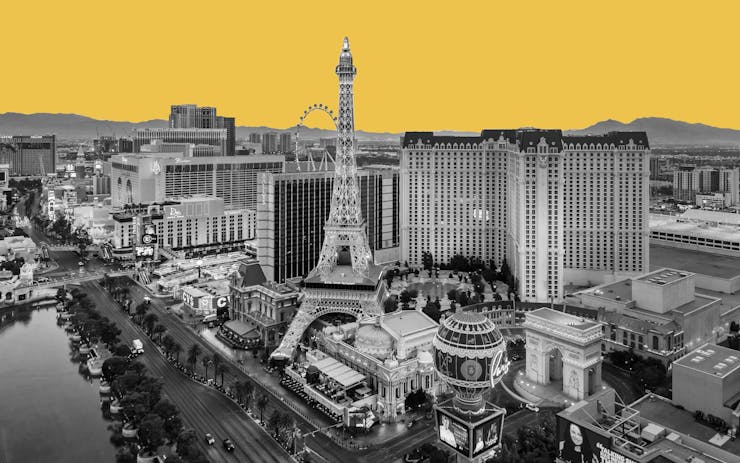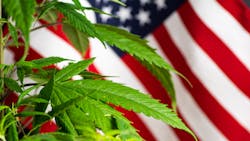Andrew Jolley, founder of Las Vegas cannabis store The Source, felt like he hit the jackpot in December when the application scores for a small number of retail cannabis licenses were announced. After applying for eight licenses, Jolley’s group was awarded seven by the state Department of Taxation, out of a total of just 61 available licenses.
Retail licenses awarded in the lottery last December are set to expire three months ahead of next year's trial date.
“The applications were scored blindly, they were ranked numerically, and then the top applicants got all of the licenses in each jurisdiction,” Jolley told Leafly. “We worked hard on our application for 14 months and did a great job.”
Most of his competitors weren’t so lucky. In fact, of 127 applicants to apply, Jolley was one of just 17 to earn a new license.
But since then, Nevada’s licensing process—which scored applications on a 250-point scale based on financial backing, business structure, and racial diversity, among other factors—has come under fire. As the result of an ongoing lawsuit alleging that the state mishandled the application process, a judge has halted the issuances of licenses to more than half the winning applicants.
It now seems Jolley and the other winners might not be so fortunate after all. With a trial set for March 2020, he and as many as 13 other owners held up in the snafu face yet another hurdle: Per state regulations, cannabis businesses must open their doors within 12 months of being awarded a license or they’ll be forced to forfeit the license. That means retail licenses awarded in the lottery last December, such as Jolley’s, are set to expire three months ahead of next year’s trial date.
Left in the lurch
Retail cannabis licenses are in short supply in the Silver State. The number of licenses is capped by law, and local bans on retail sales in 12 of Nevada’s 16 counties mean that only about 40 cannabis stores can open statewide. Greenlighting any more would require a change of state law.
A pretrial settlement is the most probable resolution, according to nearly a dozen parties involved in the ongoing litigation.
“It’s hurtful for me after spending so much time in the industry to see this happen,” said Jolley, who served for four years as the president of the Nevada Dispensary Association, the state’s most powerful industry advocacy group, from 2015 until earlier this year.
As part of the ongoing lawsuit, Clark County District Judge Elizabeth Gonzalez ruled this summer that The Source failed to meet a requirement that all of the company’s owners go through background checks before the applications were scored. Gonzalez faulted the tax department for adding a last-second stipulation that only 5% of company owners needed background checks—a move she called “arbitrary and capricious.”
Going through with the background checks, however, is easier said than done. The Source was acquired for $71 million last year by Green Growth Brands, a publicly owned company. As such, The Source now has thousands of shareholders across the globe, which creates practical obstacles to the mandatory background checks.
Untying the tangle
Scot Rutledge is a longtime political lobbyist in Las Vegas who helped spearhead Nevada’s Yes on 2 campaign in 2016 to legalize adult-use cannabis. Rutledge, who represented both winners and losers in last year’s licensing lottery, said while the licensing snafu is complicated, only a few realistic scenarios exist to put an end to the court case. And one of those, he said, is much more likely than the others.
A pretrial settlement is the most probable resolution, according to Rutledge and nearly a dozen interviewed parties involved in the ongoing litigation. If the case were to go to trial, the results could be dire. If the lottery results were upheld despite shortfalls in the process, the license winners could finally open for business. If the trial goes in favor of the plaintiffs, on the other hand, last fall’s licensing lottery could be thrown out and redone completely.
After shelling out on lawyer fees that could reach seven figures for each company by the time March rolls around, plaintiffs are unlikely to pursue a trial ending in a complete do-over of the licensing lottery, industry sources said. Some plaintiffs—most notably Las Vegas-based stores Apothecary Shoppe, NuLeaf and Las Vegas Releaf—scored significantly lower than those in the winner’s circle, and a new lottery could conceivably yield the same result. A second lottery would also open the door for other companies—including losing companies from last fall that didn’t sign on to the lawsuit—to jump back into the fray on the coattails of plaintiffs’ work in court.
Rather than reopen the process completely, industry sources predicted that higher-scoring applicants who did not win licenses—such as Planet 13, which finished within 15 points of landing a license on four of its five applications last fall, and The Grove, which finished just four points below that on all six of its applications—will negotiate a settlement with license winners held up by the injunction. On the bargaining table could be a number of actual licenses, cash payouts, or both, industry sources say. Representatives from Planet 13 and The Grove declined comment.
Regulatory discretion
As for the other obstacles, such as background checks and the 12-month cutoff date for the licensed retailers to open their doors, Rutledge said to expect some leniency thanks largely to the state’s legalization law, Question 2. The vaguely worded initiative gives the Taxation Department power to adopt “regulations necessary to carry out the provisions” of the law, meaning tax officials can make considerable changes in the name of moving the process forward.
The Department of Taxation has exercised that freedom plenty in the past, most notably in 2017 to kick off retail sales. While Question 2 called for sales to begin on January 1, 2018, the Nevada Tax Commission approved regulations to begin sales six months earlier. Less than a week after sales began, DoT passed emergency regulations to resolve a distribution bottleneck caused by distributors’ failure to keep up with booming demand.
“None of that was laid out in Question 2,” Rutledge noted. “I think we have a similar situation here, where officials used discretion, and we have precedent for the (tax) department and the governor’s office to do things that were not spelled out in the initiative.”
Department of Taxation spokesperson Eden Larson confirmed that the regulatory body could amend the 12-month deadline, but she did not say whether it is planning on doing so. Larson declined to comment on the background check rule, saying DoT does not comment on ongoing litigation.
As for new cannabis dispensaries not caught up in the August injunction, local governments have already started moving forward. Tick Segerblom, a pro-cannabis state senator-turned-Clark County commissioner, last month became one of seven local leaders in Nevada’s largest county to give the green light for six new state-licensed cannabis to apply for building permits for their new stores.
Segerblom said that local officials are aware of the uncertainty involved with new dispensaries, even those not subject to the injunction, opening before the case is resolved. He’s advising owners of the new cannabis stores to proceed at their own risk.
“It’s not the county’s role to pick winners in this thing,” Segerblom said. “But when the suit is over with and the judge says ‘These people get them and these people don’t,’ we have to listen to that. We’re telling them to go forward at their own risk, and if you want to spend millions of dollars, then more power to you.”





